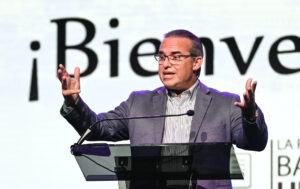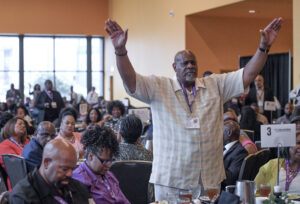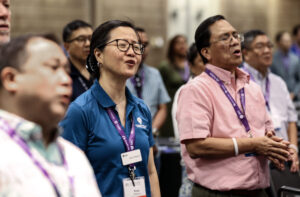STATEMENT: ‘Deeply disappointed’ yet seeing some ‘good news’
NASHVILLE, Tenn. (BP)--I am deeply disappointed that the president has decided to federally fund embryonic stem cell research on the tissue obtained from already aborted babies. I fear that this first halting step in the direction of embryonic stem cell research will build pressure to cross the important moral barrier barring the killing of more embryos to obtain their stem cells. We must always remember that these existing stem cell lines are fundamentally different than parts of a human being, such as a kidney or a heart. These stem cells are the essential, foundational building blocks of an entire human being whose life was lost before his or her stem cells were harvested.
Mohler: Bush decision has much for pro-life community to applaud
LOUISVILLE, Ky. (BP)--President Bush's decision to allow federal funding for limited embryonic stem cell research was delivered in a "statesman"-like fashion and contained much that the pro-life community can applaud, Southern Baptist Theological Seminary President R. Albert Mohler Jr. said on CNN's "Larry King Live" Aug. 9.
SBC ethicists disappointed in Bush’s stem cell decision
WASHINGTON (BP)--Southern Baptist ethics specialists expressed disappointment at President Bush's decision to provide federal funds for research on stem cells already harvested from human embryos that have been destroyed.
In a nationally televised speech Aug. 9 from his Texas ranch, Bush announced he would allow funding for research on the more than 60 lines, or groups, of existing stem cells "where the life-and-death decision has already been made." The president said this would permit stem cell research "without crossing a fundamental moral line" of funding the destruction of human embryos.
President’s stem cell decision to be telecast live tonight
WASHINGTON (BP)--After months of deliberating, President Bush will announce his decision tonight on whether to allow federal funding for embryonic stem cell research. The announcement will come in a televised address to the nation at 9 p.m. Eastern.
House Judiciary Committee approves ban on cloning
WASHINGTON (BP)--A key congressional committee approved a comprehensive ban on human cloning July 24.
Don’t ‘devalue, violate’ human life, pope tells Bush on stem cell issue
LONDON (BP)--If President Bush was looking to Pope John Paul II for guidance as he ponders a decision on whether to allow federal funding for human embryonic stem cell research, he could not have asked for a clearer message than the one delivered July 23.
FIRST-PERSON: ‘Embryo-like entities’ points up the corrosive power of euphemisms
DEERFIELD, Ill. (BP)--Words are powerful tools. They can be used as a shield or a weapon.
Frist announces support for embryonic stem cell research
WASHINGTON (BP)--U.S. Sen. Bill Frist, a pro-life Republican ally of President Bush, endorsed federal funding for embryonic stem cell research July 18.
NIH report on stem cells: More research is needed
WASHINGTON (BP)--The National Institutes of Health says more research is needed to find out "which stem cells - those derived from the embryo, the fetus, or the adult" -- will work best in treating various diseases, CNSNews.com reported July 18.
Pro-lifers condemn creation of embryos only for research
WASHINGTON (BP)--Recent reports of scientists creating human embryos or attempting to clone embryos solely for research with their stem cells, thereby destroying the early unborn babies, has stirred widespread condemnation from pro-life advocates.
The revelations of such controversial work came on successive days. The Washington Post reported in its July 11 and 12 issues, respectively:
-- Researchers at the Jones Institute for Reproductive Medicine in Norfolk, Va., have taken stem cells from embryos created by in vitro fertilization for experimentation. In doing so, the scientists became the first in the world to procure such cells from embryos created exclusively for research purposes, according to The Post.












